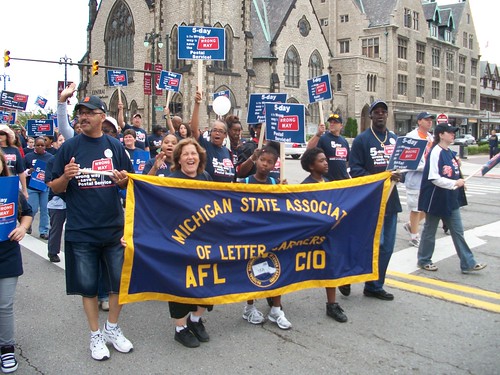
Michigan State Association of Letter Carriers, AFL-CIO members marching through downtown Detroit in the annual Labor Day march on September 6, 2010. The march attracted thousands of union members and their supporters. (Photo: Abayomi Azikiwe), a photo by Pan-African News Wire File Photos on Flickr.
AFL-CIO Endorses Obama, Cites Risks
By KRIS MAHER and MELANIE TROTTMAN
Wall Street Journal
ORLANDO, Fla.—The AFL-CIO officially endorsed President Barack Obama's re-election campaign Tuesday, just as some labor officials expressed concern that support for the president in key states is weak among rank-and-file members.
Richard Trumka, president of the AFL-CIO, announced the endorsements at the labor federation's winter meeting, where the heads of the nation's biggest labor unions discussed labor's political strategy.
Unions plan to outspend the $400 million spent during the 2008 election, with most resources being used to mobilize as many as 400,000 union volunteers to call and visit voters. The federation also expects to help 400,000 union members register to vote before November.
But labor officials acknowledged that many blue-collar workers, including union members in states like Pennsylvania, Ohio and Michigan, are far less favorable to the president than they were several months before the 2008 election.
One AFL-CIO analysis of polling data that focuses on white voters without a college degree shows that 50% of such voters are "cool" toward the president, up from 42% in September 2008, while 31% of such workers are "warm" toward Mr. Obama, down from 42% shortly before the 2008 vote.
A separate AFL-CIO analysis finds that a 7% drop in support from white-working-class voters from the 2008 level would be enough for him to lose states such as Florida, Iowa, North Carolina, Ohio and Virginia, if support among other voters remained the same as in 2008.
"It's going to be a close race," said Mike Podhorzer, political director for the AFL-CIO. Barring an increase in support from working-class voters, "this is going to be a very difficult election for [Mr. Obama] to win."
Union officials said some workers could blame Mr. Obama for high gasoline prices, while industrial unions opposed several trade agreements, including one with South Korea last year. The president's opposition of the Keystone XL pipeline for environmental reasons also angered some building trades unions.
Of course, some of the president's initiatives have been popular among unions, including the auto bailout, which has won him strong support among members of the United Auto Workers. That could give Mr. Obama a boost in Michigan and elsewhere in the Midwest.
Mr. Trumka acknowledged some workers are "disappointed" over some policy issues, but he said he believes labor's political program will eventually win them over. "I think they'll understand when we give them the facts," he said. "I think they'll understand when we give them the facts," he said.
"They tend to be pro-life, pro-gun, and they're suffering," said Terry Madonna, a professor of political science at Franklin & Marshall in Lancaster, Pa. "It's a question of whose vision compels them, and whether they're going to be a group of voters that think the president hasn't done enough for the economy."
But Jim Szucs, a business agent with Local 364 of the International Brotherhood of Teamsters in South Bend, Ind., said many members of his local who drive school buses or work in maintenance feel let down by the administration and are apathetic about the election.
"Right now, in my circles nobody's popular, and that includes the president," he said.
Write to Kris Maher at kris.maher@wsj.com and Melanie Trottman at melanie.trottman@wsj.com
No comments:
Post a Comment